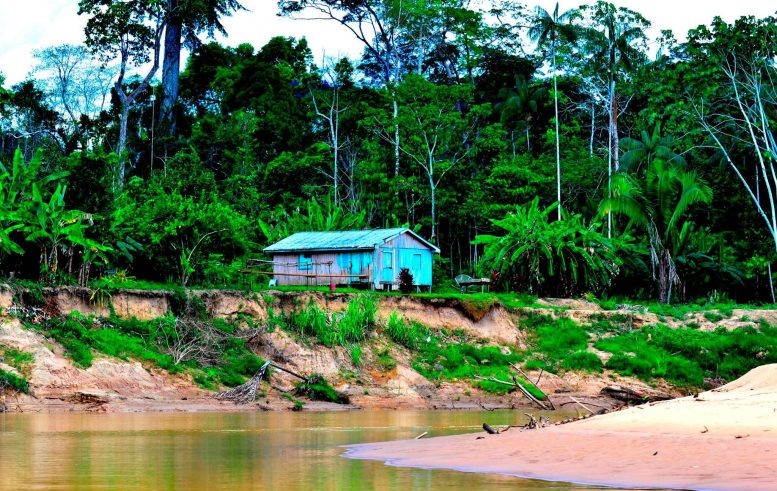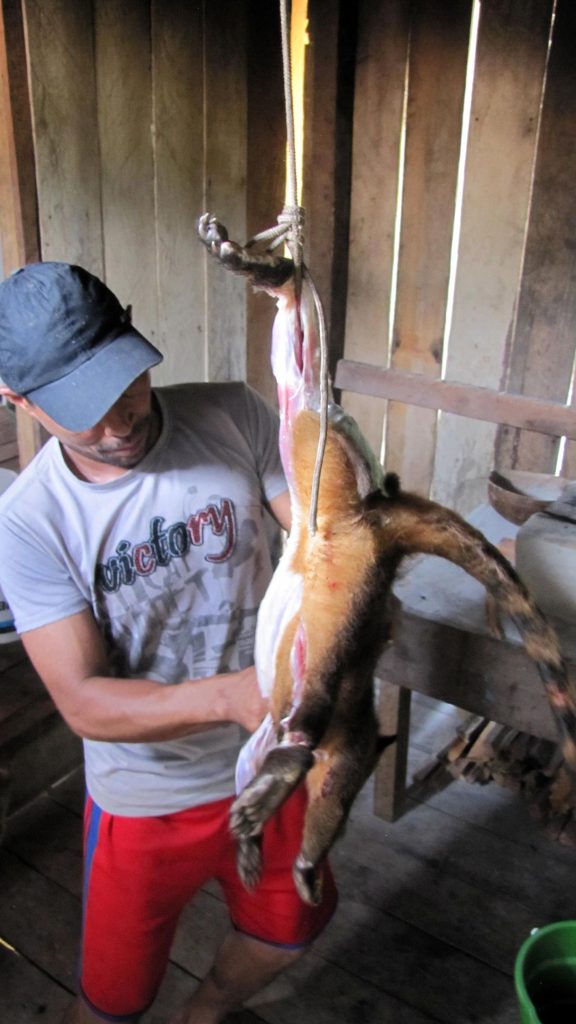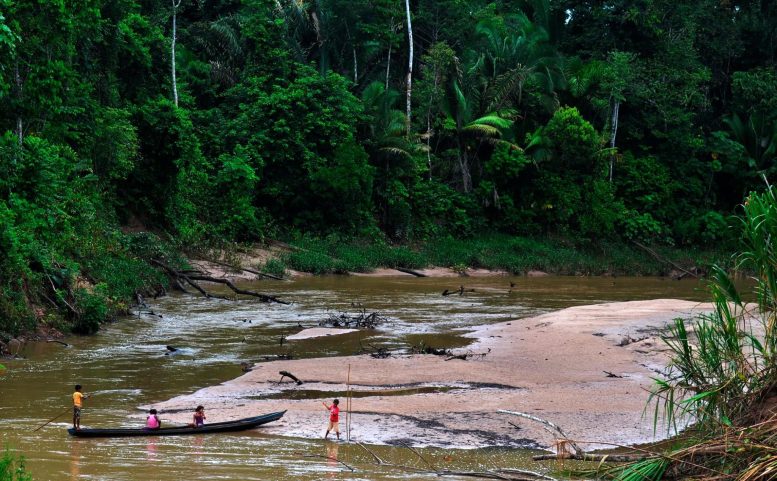
Brazilian Amazonia, in the Riozinho da Liberdade Extractive Reserve, in the state of Acre. Credit: André Nunes
Consuming sustainably sourced wild meat instead of domesticated livestock reduces greenhouse gas emissions and retains precious tropical forest systems, which in turn mitigates the effects of climate change.
That’s according to new research from the University of East Anglia (UEA) and Brazil’s Universidade Federal do Mato Grosso do Sul, published today in the journal Scientific Reports.
The research team also estimated the carbon credit value of emissions from tropical forest communities who consume wild meat instead of domesticated livestock.
André Nunes from the Universidade Federal do Mato Grosso do Sul and Carlos Peres, Professor of Conservation Science at UEA, working with Brazilian and Danish colleagues, looked at people living in both Afrotropical and Neotropical countries, including Nigeria, Ghana and Tanzania, Brazil, Peru and Bolivia.

Brazilian Amazonia, in the Riozinho da Liberdade Extractive Reserve, in the state of Acre. Credit: André Nunes
The team estimated potential revenues from the sale of associated carbon credits and how this could generate financial incentives for forest conservation and sustainable wildlife management through PES and REDD+ projects.
Payments for ecosystem services (PES) are a range of schemes through which the beneficiaries, or users, of ecosystem services provide payment to the stewards, or providers, of those services. Reduced Emissions from Deforestation and forest Degradation (REDD+) is a multilateral carbon credit trading mechanism enabling polluters in usually high-income countries to pay low-income countries for reducing deforestation and forest degradation.
Based on 150,000 residents in the Amazonian and African forests, the researchers found that an annual per capita consumption of 41.7kg (92lb) of wild meat would spare 71 metric tons of carbon dioxide equivalent (MtCO2-eq) under a bovine beef substitution scenario, and 3 MtCO2-eq if replaced by poultry.
For these tropical forest dwellers alone, this could generate US $3M or US $185K per year in carbon credit revenues under full compliance with the Paris Agreement. Under a more conservative, lower-carbon price, the wild meat substitution could generate US $1M or US $77K per year in carbon credits.
Prof Peres, a co-author in the study, said the calculations “represent considerable incentives for forest wildlife conservation, as well as potential revenues for local communities.
“Our results clearly illustrate the potential value and importance of considering sustainable game hunting within the REDD+ political process at both national and international scales.”
Tropical forest populations that harvest wild meat instead of beef, poultry, or other domesticated meat generate a much lower carbon footprint because of the emissions associated with livestock production.
Beef production from ruminant livestock involves deforestation, with strikingly detrimental repercussions for both biodiversity conservation and carbon emissions.
Land-use conversion to croplands and cattle pastures is the principal driver of deforestation worldwide. Cattle ranching is, for instance, directly responsible for 71 percent of all Latin American deforestation, and pasture expansion has been the single-largest driver of deforestation across the region since the 1970s.

Brazilian Amazonia, in the Riozinho da Liberdade Extractive Reserve, in the state of Acre. Credit: André Nunes
The livestock sector also disproportionally contributes to the environmental cost of agriculture through high resource misuse, including water, land, and soils.
Intact tropical forests act as carbon sinks, absorbing more carbon from the atmosphere than they release. Tropical forests fulfill an essential service by storing an estimated 460 billion tons of carbon, more than half the total atmospheric content.
Across the vast Amazon basin, for example, intact forest areas are concentrated mainly within indigenous territories and protected areas, which collectively store some 42 gigatonnes of carbon (GtC).
Prof Peres said: “Tropical grazeland expansion for ruminant livestock production to feed domestic meat consumption and exports is a double-jeopardy because we both lose the carbon stocks from formerly pristine old-growth forests and woody savannahs and generate a powerful perennial methane pump.
“Subsistence hunting of game animals by local communities, which is pervasive in tropical forests, needs to become a sustainable mechanism of both helping justify and add economic value to otherwise undisturbed forests in terms of low-carbon animal protein production.”
Wild meat provides nutritional and symbolic value for communities living in tropical forests. But, the researchers say, traditional hunting must be done sustainably, both to maintain intact forests and support the food chain.
Dr. Nunes, lead author of the study, said: “Securing the sustainable consumption of wild meat for populations that are socially vulnerable is very important, not just in terms of food security and well-being, but also to serve the interests of climate change mitigation efforts in REDD+ accords through avoided greenhouse gas emissions.
“Tropical forest biodiversity conservation, and how forest dwellers use forest resources, need urgent financial investments.”
Unsustainable hunting can have cascading effects that suppress the long-term carbon storage capacity of natural forests by depleting large-bodied bird and mammal species serving essential ecosystem functions, such as dispersal of large-seeded carbon-dense tree species. Unsustainable hunting, therefore, can lead to shifts in the species composition of tropical tree assemblages that ultimately reduce the forest carbon storage capacity.
On the other hand, hunting can provide a sustainable source of protein and essential micronutrients if appropriately monitored and managed. Forecasts predict widespread protein deficiency in a range of tropical countries, and case studies suggest increased risk of anemia in children if wild meat is insufficient to the point where the prevalence of child growth stunting can be negatively related to game abundance.
Dr. Nunes said: “These challenges should be confronted in collaboration with local communities through community-based wildlife management projects to safeguard relatively intact forests, carbon storage, and long-term hunting yields.
“Enabling resource co-management by marginalized tropical forest communities will require transparency and devolution of tangible benefits from carbon credit revenues.”
Reference: “Wild meat consumption in tropical forests spares a significant carbon footprint from the livestock production sector” by André Valle Nunes, Carlos A. Peres, Pedro de Araujo Lima Constantino, Erich Fischer and Martin Reinhardt Nielsen, 7 October 2021, Scientific Reports.
DOI: 10.1038/s41598-021-98282-4









“Tropical forest populations that harvest wild meat instead of beef, poultry or other domesticated meat generate a much lower carbon footprint because of the emissions associated with livestock production.”
Short-sighted, illogical rationalizations! Tropical forests are excellent at sequestering CO2. The low-density human populations of tropical forests have a minuscule contribution to the 3% anthropogenic emissions that are a part of the Carbon Cycle. Depending on wild game can have a profound impact on rare or endangered species, particularly the predators at the top of the food chain, as illustrated by the cat in the article. The evolution of pandemic diseases like Ebola and Covid are one of the likely consequences of encouraging ‘bush meat’ now that the people living in tropical forests are no longer isolated from the rest of the world.
“Land-use conversion to croplands and cattle pastures are the principal driver of deforestation worldwide.”
This is done NOT to feed the indigenous people, but to be be exported to cities to feed the growing populations.
This is another example of how academics who are focused on saving the world, lose sight of the big picture.
Sᴛᴀʀᴛ ᴡᴏʀᴋɪɴɢ ғʀᴏᴍ ʜᴏᴍᴇ! Gʀᴇᴀᴛ ᴊᴏʙ ғᴏʀ Ever, sᴛᴀʏ-ᴀᴛ-ʜᴏᴍᴇ ᴍᴏᴍs ᴏʀ ᴀɴʏᴏɴᴇ ɴᴇᴇᴅɪɴɢ ᴀɴ ᴇxᴛʀᴀ ɪɴᴄᴏᴍᴇ… Yᴏᴜ ᴏɴʟʏ ɴᴇᴇᴅ ᴀ ᴄᴏᴍᴘᴜᴛᴇʀ ᴀɴᴅ ᴀ ʀᴇʟɪᴀʙʟᴇ ɪɴᴛᴇʀɴᴇᴛ ᴄᴏɴɴᴇᴄᴛɪᴏɴ… Mᴀᴋᴇ $100 ʜᴏᴜʀʟʏ ᴀɴᴅ ᴜᴘ ᴛᴏ $13k ᴀ ᴍᴏɴᴛʜ ʙʏ ғᴏʟʟᴏᴡɪɴɢ connection ᴀᴛ ᴛʜᴇ ʙᴏᴛᴛᴏᴍ .Yᴏᴜ ᴄᴀɴ ʜᴀᴠᴇ ʏᴏᴜʀ ғɪʀsᴛ ᴄʜᴇᴄᴋ ʙʏ ᴛʜᴇ ᴇɴᴅ ᴏғ ᴛʜɪs ᴡᴇᴇᴋ. ᴊᴏɪɴ ᴛʜɪꜱ ᴊᴏʙ ᴀɴᴅ ᴍᴀᴋᴇ ᴇxᴛʀᴀ ɪɴᴄᴏᴍᴇ ɪɴ ᴘᴀʀᴛ ᴛɪᴍᴇ ʙʏ ꜰᴏʟʟᴏᴡ ᴛʜɪꜱ ʟɪɴᴋ……………► 𝐖𝐰𝐰.𝐄𝐱𝐭𝐫𝐚𝐑𝐢𝐜𝐡𝟏.𝐜𝐨𝐦
Absurd on its face, as you’d expect from the U of East Anglia, one of the heavy hitters in the climate change campaign to de-industrialize the West.
Let’s leave the wildlife alone, for pity’s sake.
In addition to the very valid points already raised, anyone worthy of being called a scientist now knows that the consumption of bushmeat provides a major channel to new zoonotic viral pandemics. A new virus with the ability to spread equal to that of measles, and a death rate similar to that of ebola could kill billions and put an end to civilization. I think the recommendation in this article is deplorable, and for Scitech to try to popularise it is disgraceful.
As much as I disagree with the conclusions and recommendations of the article, I think it is important for us to see what kind of things are being published and promoted by academics. I encourage SciTechDaily to provide us with a diverse range of viewpoints. What I object to is two or three articles within a short period of time that are essentially identical. That smacks of advocacy.